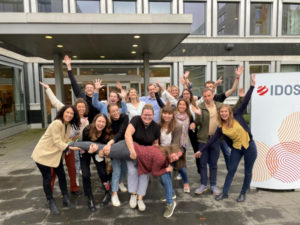We are seventeen participants this year and very fortunate to be back at IDOS full-time, after two years of Covid restrictions affecting our previous cohorts. As we begin our programme, we also welcome our new programme coordinator, Simone Christ!
Currently, we are in the midst of the two-month plenary phase, during which we explore a wide range of issues related to development cooperation. For instance, we have dealt with climate governance, democracy, corruption, gender, development finance and norm diffusion.
Controversial debates form an integral part of the lectures and seminars, during which we have already held discussions on topics ranging from the coherence of German development cooperation, the advantages and disadvantages of free trade agreements, postcolonial thinking – both within and outside development cooperation – or the pitfalls of gender mainstreaming. Special highlights were also the numerous role plays. In the course of these, we adopted different standpoints and perspectives and thus learned to better understand the motivations and interests of various actors, such as small farmers, indigenous people or the forestry industry in a debate on the sustainable use of forests and the protection of biodiversity.
The seminars also regularly challenged us on a personal level by spurring a critical reflection on our own role and privileges as well as the raison d’être of development cooperation. „How can colonial continuities be dealt with in international cooperation?“, „How can research partners from the Global South and their knowledge be included in scientific research?“ or „Which actors set the agenda?“. These are just a few of the many questions that accompany us beyond the duration of the sessions. In critically examining our own internalized racisms as well as our role (both within and outside of IDOS), we realized that a self-critical perspective will (and must) be a central component of our future work in development cooperation. It is particularly important not only to look at WHAT is done (content or policy), but also not to forget HOW implementation processes take place (politics and polity). We noted: „If you don’t understand the context, don’t intervene. Do not harm!“
As this exciting section of the postgraduate programme is slowly coming to an end we look forward to the simulation game of government negotiations which represents the culmination of our plenary phase. During the realistic simulation, we will learn first-hand how the content of bilateral cooperation between the Federal Republic of Germany and a partner country is negotiated and decided upon. From November onwards, we will be divided into three research teams. Together with our team leaders, we will undertake research on sustainable finance taxonomies and regulations in South Africa, institutional sanitation management and its impact on health in Kenya, and digitalization of the public sector in Brazil. We are excited!

